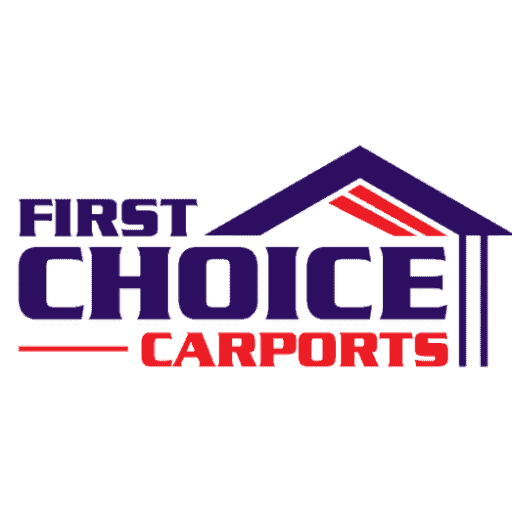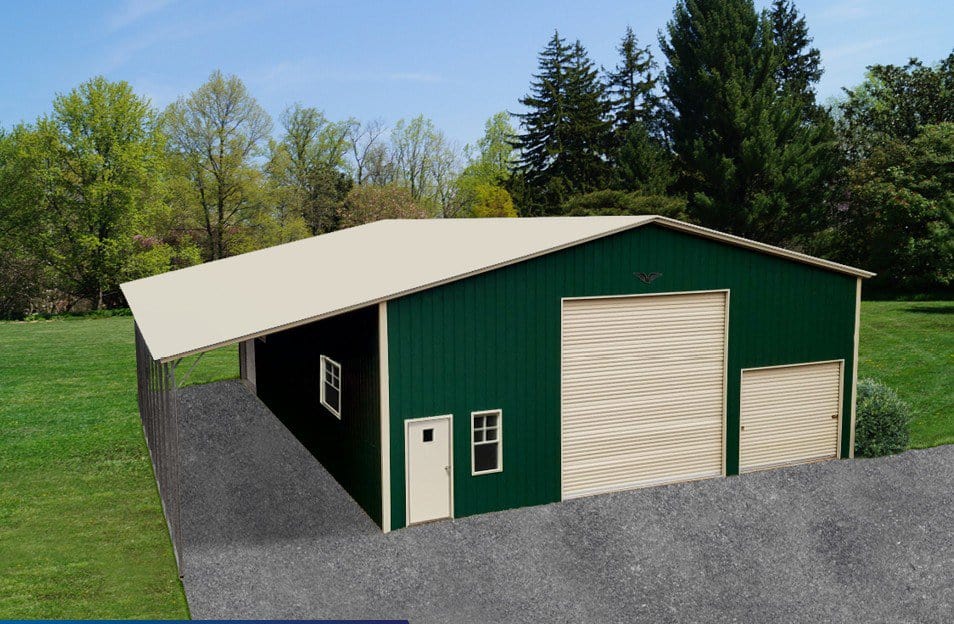Introduction
In the realm of property enhancement and protection, metal carports stand out as versatile solutions for safeguarding vehicles, equipment, and outdoor belongings from the elements. However, amidst the myriad of options available, the choice of roofing for your metal carport emerges as a critical decision, influencing not only its durability and functionality but also its aesthetic appeal. In this comprehensive guide, we delve into the intricate details of metal carport roofing types, empowering you to make an informed decision that perfectly suits your needs and preferences.
Understanding Metal Carport Roofing Types
Vertical Metal Carport Roofing
Vertical metal carport roofing stands out for its unparalleled strength and resilience, making it the go-to option for areas prone to severe weather conditions. Unlike boxed eave roofing, which utilizes horizontally oriented panels, vertical roofing employs vertically oriented panels that run from the peak of the structure to the eaves. This design not only enhances the structural integrity of the carport but also facilitates efficient water and debris runoff, ensuring optimal protection for your vehicles and belongings.
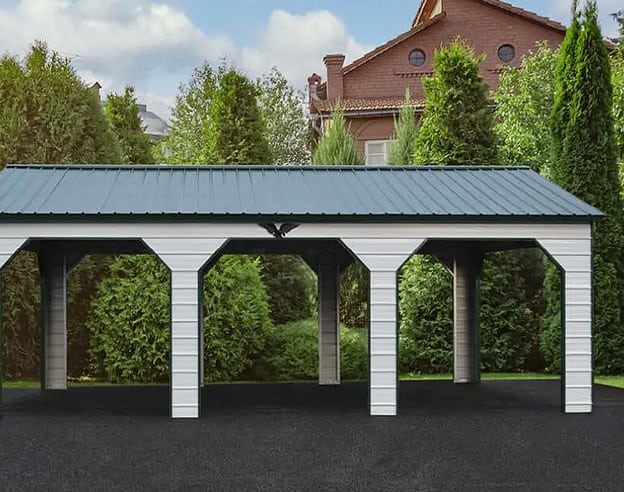
Comparing Metal Carport Roofing Types
Boxed Eave Metal Carport Roofing
Boxed eave metal carport roofing presents a fusion of style and affordability, making it a popular choice among homeowners seeking a sleek and modern look without breaking the bank. Characterized by horizontally oriented panels with a slight overhang at the edges, boxed eave roofing exudes elegance while providing adequate protection against the elements. This roofing type is ideal for those looking to strike a balance between aesthetics and cost-effectiveness.
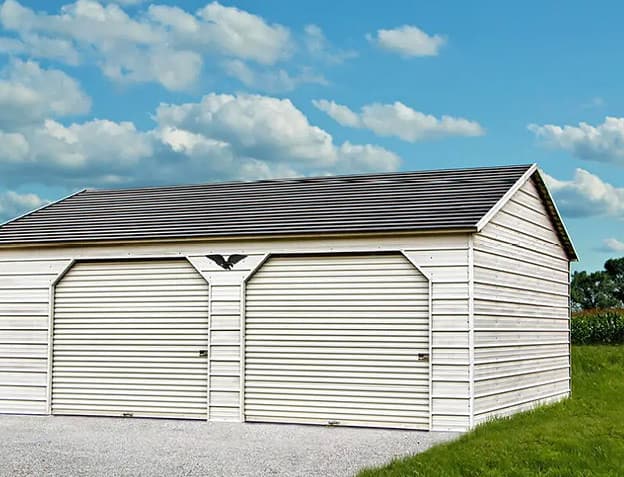
Regular Roof Metal Carport Roofing
Regular roof metal carport roofing, also known as curved eave carports, boasts a distinctive curved design that adds a touch of sophistication to any property. While not as durable as vertical roofing, regular roof carports offer a cost-effective solution for protecting your vehicles and outdoor equipment. With proper maintenance, they can provide reliable shelter for years to come, making them a popular choice among budget-conscious homeowners.
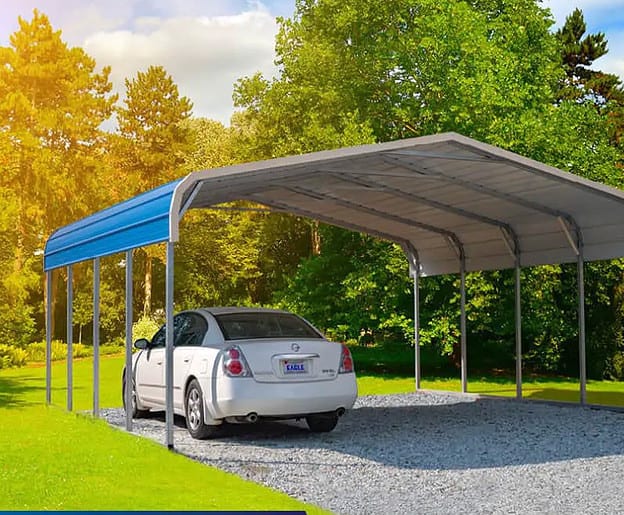
Appearance
- Boxed Eave: Sleek and modern, suitable for contemporary properties.
- Vertical: Robust and streamlined, ideal for areas with heavy rainfall or snowfall.
- Regular Roof: Elegantly curved, adding a touch of sophistication to any property.
Durability
- Boxed Eave: Moderate durability, suitable for moderate weather conditions.
- Vertical: High durability, capable of withstanding severe weather conditions.
- Regular Roof: Moderate durability, requiring proper maintenance for longevity.
Price
- Boxed Eave: Affordable, making it accessible to a wide range of homeowners.
- Vertical: Moderately priced, reflecting its superior strength and resilience.
- Regular Roof: Budget-friendly, offering cost-effective protection for your vehicles and belongings.
Weather Resistance
- Vertical: Excelling in areas with heavy rainfall or snowfall, ensuring efficient water and debris runoff.
- Boxed Eave: Suitable for moderate weather conditions, may require additional maintenance in harsh environments.
- Regular Roof: Adequate for mild to moderate weather conditions, may not withstand extreme weather events without proper reinforcement.
Making the Right Choice for Your Property
When it comes to selecting the perfect metal carport roofing type for your property, several factors come into play, including your budget, aesthetic preferences, and local weather conditions. By carefully weighing the pros and cons of boxed eave, vertical, and regular roof carports, you can make an informed decision that ensures the longevity and functionality of your structure. Whether you prioritize style, durability, or affordability, there’s a metal carport roofing type that meets your needs, providing reliable protection for your vehicles and outdoor belongings.
Conclusion
In conclusion, the choice of roofing for your metal carport is a decision that should not be taken lightly. By understanding the unique characteristics and considerations of boxed eave, vertical, and regular roof carports, you can select the option that best suits your property and lifestyle. Whether you opt for the sleek and modern appeal of boxed eave roofing, the robust resilience of vertical roofing, or the timeless elegance of regular roof carports, you can rest assured knowing that your vehicles and outdoor belongings are well-protected against the elements. With this comprehensive guide at your disposal, you’re equipped to make the right choice for your property and enjoy years of reliable shelter and peace of mind.
Measuring Your Metal Building Made Easy Three Easy Steps
Diagram: Metal Carport Roofing Types Comparison
graph TD;
A[Vertical Metal Carport Roofing] -->|Superior Strength| B;
A -->|Efficient Water Runoff| C;
B[Boxed Eave Metal Carport Roofing] -->|Sleek Appearance| D;
B -->|Affordable| E;
C[Regular Roof Metal Carport Roofing] -->|Curved Design| F;
C -->|Cost-effective| G;
With this comprehensive guide and detailed comparison, you’re well-equipped to make an informed decision and choose the perfect metal carport roofing type for your property.
What You Need To Know When Buying a Metal Garage.
FAQ’S
- What is a carport? A carport is a covered structure designed to provide protection to vehicles, typically parked outside. Carports are typically supported by posts and do not have four walls like a traditional garage.
- What is the difference between a carport and a garage? A carport is a covered structure designed to protect vehicles from weather elements. It typically has open sides and is not enclosed like a garage. A garage is an enclosed structure with walls and a door that can be locked.
- What are the benefits of building a carport? The benefits of building a carport include protecting your vehicle from weather elements such as sun, rain, snow, and hail. Additionally, carports provide shade, which can help prevent damage to your vehicle’s paint and interior from the sun’s harmful UV rays.
- How long does it take to build a carport? The time it takes to build a carport varies depending on the complexity of the design, the size of the carport, and the materials used. Typically, a simple carport can be built in a day or two, while more complex designs may take several days to complete.
- Do I need a building permit to build a carport? Building permit requirements vary depending on the location and the size of the carport. In most cases, a building permit is required for carports that are larger than 200 square feet or higher than eight feet. It’s important to check with your local building department to determine the specific requirements for your area.
- What materials are commonly used to build a carport? Carports can be built with a variety of materials, including wood, metal, and aluminum. The most common materials used for carports are metal and aluminum because they are durable, low maintenance, and relatively easy to install.
- Can I customize my carport design? Yes, carport designs can be customized to fit your specific needs and preferences. You can choose from different materials, colors, and styles to create a custom carport that meets your requirements.
